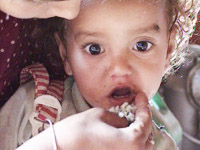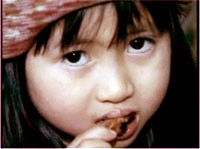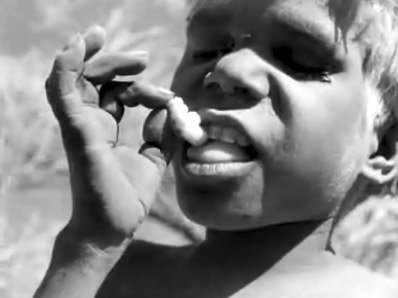|
Anthropology in the News
|
|
|||||||||||||||||||||||||||||||
 "Palermo, Sicily Italy |
 A Fistfull of Rice Nepal |
 Claire Kathleen Roufs U.S.A. |
 "Eating Rat At The New Year" Vietnam National Geographic |
 Desert People Australia |
The End of the Line: streaming video not available A film by Rupert Murray (approx. 83 min., SH 329. 94 E43 2010 DVD) The End of the Line -- Amazon.comWikipedia:
|
Scenes
|
From the End of the Line HomePage . . .
The FilmThe world’s first major documentary about the devastating effect of overfishing premiered at Sundance Film FestivalImagine an ocean without fish. Imagine your meals without seafood. Imagine the global consequences. This is the future if we do not stop, think and act.
The End of the Line, the first major feature documentary film revealing the impact of overfishing on our oceans, had its world premiere at the Sundance Film Festival in the World Cinema Documentary Competition. Sundance took place in Park City, Utah, January 15-25, 2009. In the film we see firsthand the effects of our global love affair with fish as food. It examines the imminent extinction of bluefin tuna, brought on by increasing western demand for sushi; the impact on marine life resulting in huge overpopulation of jellyfish; and the profound implications of a future world with no fish that would bring certain mass starvation. Filmed over two years, The End of the Line follows the investigative reporter Charles Clover as he confronts politicians and celebrity restaurateurs, who exhibit little regard for the damage they are doing to the oceans. One of his allies is the former tuna farmer turned whistleblower Roberto Mielgo – on the trail of those destroying the world's magnificent bluefin tuna population. Filmed across the world – from the Straits of Gibraltar to the coasts of Senegal and Alaska to the Tokyo fish market – featuring top scientists, indigenous fishermen and fisheries enforcement officials, The End of the Line is a wake-up call to the world. The end of seafood by 2048Scientists predict that if we continue fishing as we are now, we will see the end of most seafood by 2048. The End of the Line chronicles how demand for cod off the coast of Newfoundland in the early 1990s led to the decimation of the most abundant cod population in the world, how hi-tech fishing vessels leave no escape routes for fish populations and how farmed fish as a solution is a myth. The film lays the responsibility squarely on consumers who innocently buy endangered fish, politicians who ignore the advice and pleas of scientists, fishermen who break quotas and fish illegally, and the global fishing industry that is slow to react to an impending disaster. The End of the Line points to solutions that are simple and doable, but political will and activism are crucial to solve this international problem. We need to control fishing by reducing the number of fishing boats across the world, protect large areas of the ocean through a network of marine reserves off limits to fishing, and educate consumers that they have a choice by purchasing fish from independently certified sustainable fisheries. Global campaignThe End of the Line premiere at Sundance will also kick-off a global campaign for citizens to demand better marine policies. Leading international environmental organizations are lending their full support to the film. The End of the Line will be released worldwide in 2009 using multiple formats and venues including theaters, broadcast and cable television networks, film festivals, online video campaigns, aquariums, museums and special screenings for environmental and educational organizations. "There is no better place than Sundance for The End of the Line to have its world premiere," said the film's director, Rupert Murray. "Sundance has a long history of making cutting edge, issue-based documentaries matter." Murray's first film, "Unknown White Male" premiered at the festival in 2005. Charles Clover, the book's author, said: "We must stop thinking of our oceans as a food factory and realize that they thrive as a huge and complex marine environment. "We must act now to protect the sea from rampant overfishing so that there will be fish in the sea for our grandchildren and great-grandchildren." "Overfishing is the great environmental disaster that people haven't heard about," said producer George Duffield. "A recent global conference about bluefin tuna stocks saw almost no media coverage in the U.S. We hope this film really sounds the alarm. We can fix this problem starting right now." "Reading the book The End of the Line changed my life and what I eat. I hope the film will do the same for others," said producer Claire Lewis. How the film was financedThe End of the Line is a leading example of the new wave of documentary. It is an independent film – made outside the established broadcasting structure. It is a campaigning film which aims to change the world by engaging large public audiences in a political issue. And it is a project which is integrated with the work of NGOs and progressive companies to achieve this change. The film’s financing is an example of the new model of funding: with cornerstone funding from the UK’s Channel 4 BRITDOC Foundation, the vast bulk of the finance came from not-for-profit foundations in the UK and the USA. In the UK the cinema release of the film was supported financially by Waitrose - a major UK retailer. The film has received financial support from: The Waitt Family Foundation, Marviva, The Oak Foundation, Channel 4 BRITDOC Foundation, WWF, The Weston Foundation, The Clore Foundation, The Marine Conservation Society, AD Charitable Trust, GD Charitable Trust, Waterloo Foundation and Oceana. |
Amazon.com
"The End of the Line is a gripping, sobering documentary for anyone who loves fish, the ocean--and the health of the earth's entire ecosystem. British filmmaker Rupert Murray has created a must-see film--a true call to action--that compellingly makes the case that the earth's oceans must be preserved, like great areas of the land, for future generations, to prevent the emptying of the seas of fish. Murray examines modern fishing practices, and the lack of agreement in the global community on what's acceptable. Trawling, for example, still the major form of catching mass quantities of fish, is done many times a year in the same spot--a practice, Murray tells the viewer, akin to 'plowing a field seven times a year.' The yield is, and will be, ever diminishing." Description
"Humans have long regarded the world's oceans as vast and inexhaustible. Now, we have learned otherwise. |
In the News . . .
|
|
|
 Page URL: http:// www.d.umn.edu /cla/faculty/troufs/anthfood/video/End_of_the_Line.html Site Information |
||
View Stats |
|